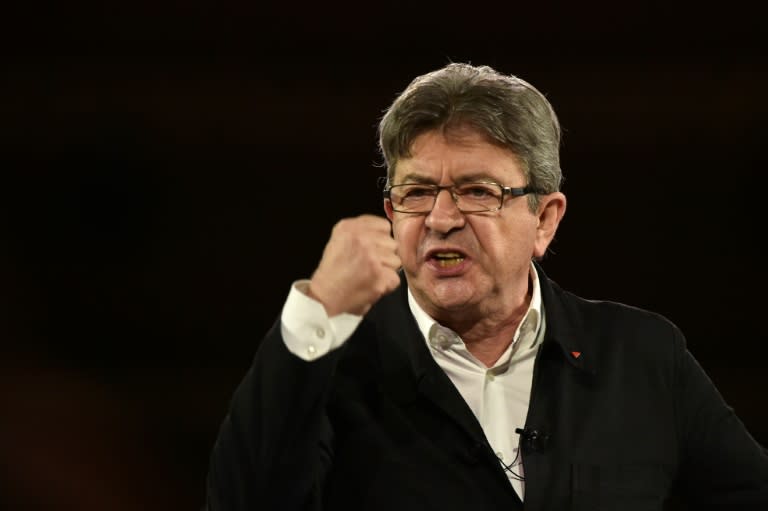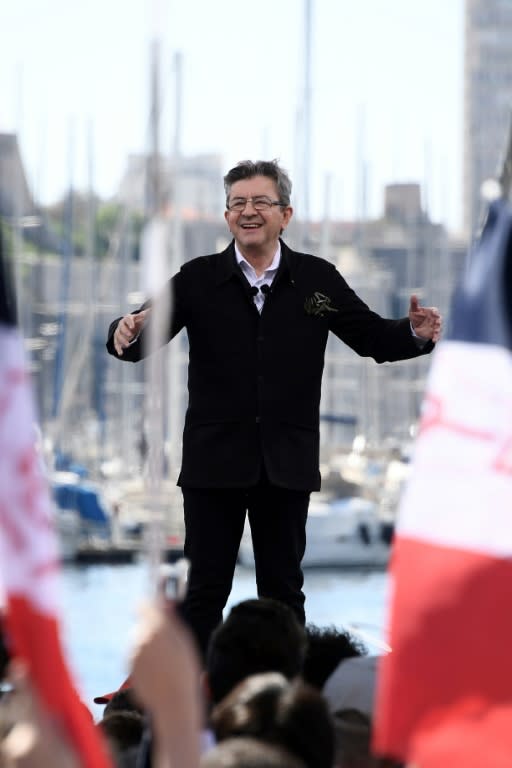Melenchon, France's failed hard-left presidential candidate
Jean-Luc Melenchon, who crashed out of France's unpredictable presidential election Sunday, is a fiery Communist-backed eurosceptic who had vowed to return "power to the people". Melenchon had enjoyed a late surge ahead of the first-round vote in an election marked by widespread disillusionment with the political class. But initial projections put the head of La France Insoumise (France Unbowed) trailing in fourth place behind far-right leader Marine Le Pen, centrist Emmanuel Macron and conservative Francois Fillon. Despite his reputation as a firebrand, the left-winger admitted during the campaign he had mellowed after years spent lambasting the establishment. "I'm less of a hothead," the bespectacled 65-year-old said in a recent interview. "I'm becoming a reassuring figure." Observers said strong debate performances showcasing a more temperate but still quick-witted Melenchon had helped propel him into serious contention. Melenchon "invented political stand-up. He's become a showman," said former Socialist Party colleague Julien Dray. The candidate showed a blend of calm and defiance Friday by going ahead with a campaign event while rivals cancelled theirs in the wake of the jihadist shooting of a police officer on Paris's Champs Elysees. The oldest of the main candidates had made the most intensive use of the internet, boasting more than a million followers on Twitter and his own YouTube channel -- a way to circumvent the traditional media, which he accused of bias. - Rhetoric and social media savvy - And he turned heads with simultaneous appearances at campaign rallies using holograms, a technological first for a French presidential campaign. With the ruling Socialist Party split between leftist and reformist camps, its candidate Benoit Hamon languished in a distant fifth place in the polls. After emphatically refusing to ally himself with Hamon, Melenchon emerged for many as the main voice on the left. Often appearing at rallies wearing a Chairman Mao-style jacket, Melenchon spoke without notes as he railed against the "neo-liberal" European Union and pushed his tax-and-spend agenda. But while he shared far-right leader Marine Le Pen's animosity toward the EU -- they are both currently MEPs -- Melenchon was her polar opposite when it came to immigration. "Today as yesterday, I am delighted that France is a mix of races and all the children are our children," he had said. An admirer of late Venezuelan president Hugo Chavez as well as Bolivian leader Evo Morales, he advocated a policy of non-alignment and wanted to withdraw from NATO. While supporters saw him as a defender of the people against moneyed interests, to his detractors Melenchon, who wanted to legalise cannabis, was a dangerous populist -- Hollande called him a "peril" while the right-leaning Figaro daily called him the "French Chavez". Born in Morocco, Melenchon, who studied philosophy, was a Trotskyist student activist before joining the Socialists at 25 and becoming the youngest member of the Senate in 1986. - 'Our country needs another voice' - He served as vocational education minister under Socialist premier Lionel Jospin from 2000 to 2002. But in 2008, Melenchon fell out with party leader Hollande and quit the Socialists, saying "our country needs another voice on the left". With his virulent attacks against bosses and austerity policies, he won 11 percent when he ran for president in 2012 as head of the Parti de Gauche (Left Party). This time he emerged as a hard-left alternative to Le Pen and the other "outsider", the pro-business Emmanuel Macron, vowing to scrap France's "monarchical presidency" and give far more power to parliament. Despite a softer image, Melenchon insisted he still had fire in his belly. "You can't propose what I am proposing with the look of a choirboy," he said. "Sometimes there's no choice, you have to kick the doors open."




